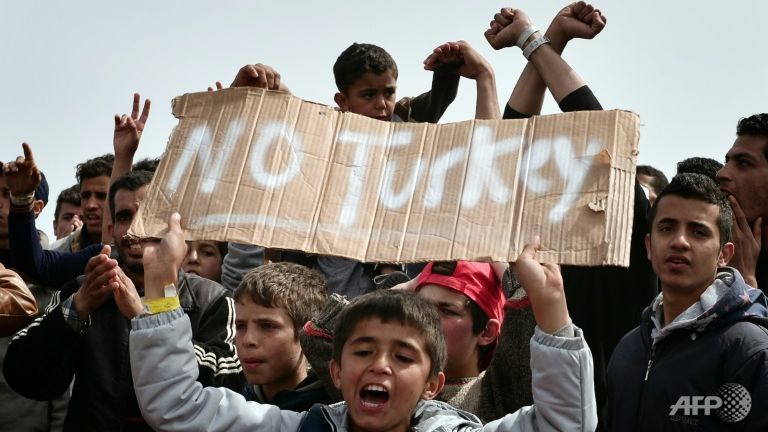EU to give Turkey visa-free travel to save migrant deal
 |
| Turkey has demanded visa-free travel in exchange for taking back migrants who land in Greece. (Photo: AFP/Louisa Gouliamaki) |
BRUSSELS: The European Commission will on Wednesday (May 4) give conditional backing to visa-free travel for more than 80 million Turks as the EU tries to save a controversial deal with Ankara to solve the migrant crisis.
Brussels is also set to announce further measures to tackle the biggest influx of migrants since World War II, with an extension of border controls in the passport-free Schengen zone and an overhaul of its asylum rules.
Turkey has threatened to tear up the March agreement to take back migrants who cross the Aegean Sea to Greece if the EU fails to keep its promise to allow Turkish citizens to travel without visas to the Schengen area by next month.
Many EU states still have concerns about the legality of the deal and the human rights situation in Turkey, and the plan for 90-day visas must be cleared by all 28 nations in the bloc and the European Parliament.
The Commission is expected to find that Turkey has achieved only 64 of the 72 benchmarks needed for visa-free travel, which range from biometric passports to respect for human rights, European sources told AFP.
This means that it will back the visa arrangement if Ankara completes the so-called visa liberalisation roadmap by the end of June, the sources said.
SCHENGEN BORDER RULES
The Turkish deal is the cornerstone of the EU's plan to curb a crisis that has seen 1.25 million Syrian, Iraqi, Afghan and other migrants enter since 2015, though the numbers of arrivals have dropped since March.
Turkey meanwhile has been rushing through laws in recent days to meet the EU's requirements, although that effort has occasionally stalled because of a series of mass brawls in parliament.
The new laws include making a reciprocal visa agreement for EU nationals, including those of Cyprus, with which Turkey has long-standing tensions over its occupation of the north of the Mediterranean island.
"Yesterday, a government decree has been adopted by the Turkish government allowing the access to Turkish territory without visa for citizens of all 28 member states, I repeat all 28," Commission spokesman Margaritis Schinas said.
On Wednesday the EU will also allow countries to extend border controls in the Schengen area as a result of the migrant crisis and recent terror attacks.
Germany, France, Austria, Denmark and Sweden requested the extension, saying the border situation remains "extremely volatile".
Since 2015 several countries in the 26-nation Schengen zone have reintroduced border controls due to the migrant crisis -- effectively suspending its principle of border-free travel.
European sources said the Commission was to approve the measure in line with its so-called "roadmap" for the restoration of the normal functioning of Schengen "by the end of the year".
EU rules say countries can reintroduce border controls for up to two years, in periods of up to six months at a time, in exceptional circumstances.
DUBLIN RULES
Also Wednesday, the EU is expected to unveil an overhaul of its asylum rules to more fairly share responsibility for migrants and refugees arriving in Europe.
The so-called Dublin rules currently in force have been criticised as obsolete and unfair to countries like Greece, where most of the migrants entered the bloc last year.
Under those rules, migrants seeking asylum must lodge their application in the country where they first arrived, and should be returned there if they try to move elsewhere in the bloc.
The Commission is expected to propose a special mechanism whereby refugees and migrants can be relocated to other countries if a crisis is declared -- for example in Greece.
The Financial Times reported that countries that do not take their share could be fined 250,000 euros per person that they refuse to accept. But the EU is expected to shun a complete overhaul of the Dublin rules.
What the stars mean:
★ Poor ★ ★ Promising ★★★ Good ★★★★ Very good ★★★★★ Exceptional
Latest News
More News
- Russian President congratulates Vietnamese Party leader during phone talks (January 25, 2026 | 09:58)
- Worldwide congratulations underscore confidence in Vietnam’s 14th Party Congress (January 23, 2026 | 09:02)
- Political parties, organisations, int’l friends send congratulations to 14th National Party Congress (January 22, 2026 | 09:33)
- 14th National Party Congress: Japanese media highlight Vietnam’s growth targets (January 21, 2026 | 09:46)
- 14th National Party Congress: Driving force for Vietnam to continue renewal, innovation, breakthroughs (January 21, 2026 | 09:42)
- Vietnam remains spiritual support for progressive forces: Colombian party leader (January 21, 2026 | 08:00)
- Int'l media provides large coverage of 14th National Party Congress's first working day (January 20, 2026 | 09:09)
- Vietnamese firms win top honours at ASEAN Digital Awards (January 16, 2026 | 16:45)
- ASEAN Digital Ministers' Meeting opens in Hanoi (January 15, 2026 | 15:33)
- ASEAN economies move up the global chip value chain (December 09, 2025 | 13:32)
















 Mobile Version
Mobile Version